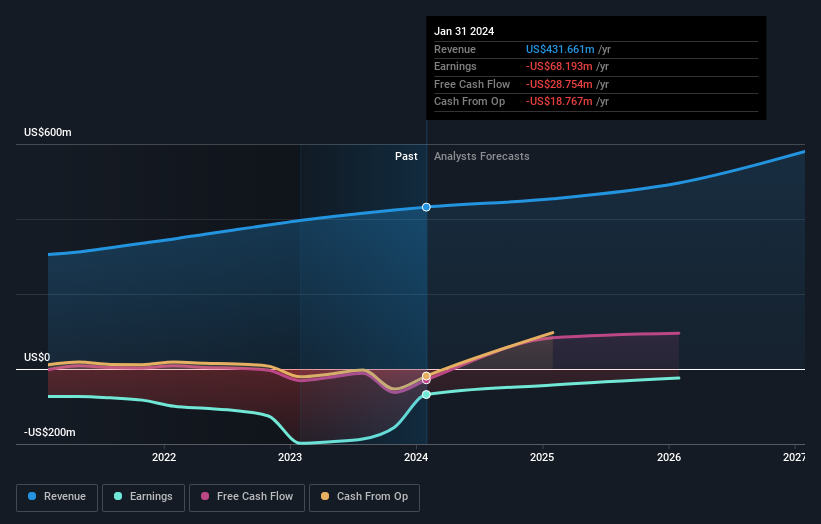- United States
- /
- Software
- /
- NYSE:ZUO
Institutional investors control 74% of Zuora, Inc. (NYSE:ZUO) and were rewarded last week after stock increased 3.7%

Key Insights
- Institutions' substantial holdings in Zuora implies that they have significant influence over the company's share price
- The top 13 shareholders own 51% of the company
- Insiders have sold recently
A look at the shareholders of Zuora, Inc. (NYSE:ZUO) can tell us which group is most powerful. With 74% stake, institutions possess the maximum shares in the company. That is, the group stands to benefit the most if the stock rises (or lose the most if there is a downturn).
And as as result, institutional investors reaped the most rewards after the company's stock price gained 3.7% last week. One-year return to shareholders is currently 34% and last week’s gain was the icing on the cake.
Let's take a closer look to see what the different types of shareholders can tell us about Zuora.
Check out our latest analysis for Zuora

What Does The Institutional Ownership Tell Us About Zuora?
Institutions typically measure themselves against a benchmark when reporting to their own investors, so they often become more enthusiastic about a stock once it's included in a major index. We would expect most companies to have some institutions on the register, especially if they are growing.
Zuora already has institutions on the share registry. Indeed, they own a respectable stake in the company. This implies the analysts working for those institutions have looked at the stock and they like it. But just like anyone else, they could be wrong. If multiple institutions change their view on a stock at the same time, you could see the share price drop fast. It's therefore worth looking at Zuora's earnings history below. Of course, the future is what really matters.

Investors should note that institutions actually own more than half the company, so they can collectively wield significant power. Hedge funds don't have many shares in Zuora. The company's largest shareholder is The Vanguard Group, Inc., with ownership of 11%. For context, the second largest shareholder holds about 9.5% of the shares outstanding, followed by an ownership of 5.5% by the third-largest shareholder. Tien Tzuo, who is the third-largest shareholder, also happens to hold the title of Chairman of the Board.
A closer look at our ownership figures suggests that the top 13 shareholders have a combined ownership of 51% implying that no single shareholder has a majority.
While it makes sense to study institutional ownership data for a company, it also makes sense to study analyst sentiments to know which way the wind is blowing. There are a reasonable number of analysts covering the stock, so it might be useful to find out their aggregate view on the future.
Insider Ownership Of Zuora
The definition of an insider can differ slightly between different countries, but members of the board of directors always count. The company management answer to the board and the latter should represent the interests of shareholders. Notably, sometimes top-level managers are on the board themselves.
Insider ownership is positive when it signals leadership are thinking like the true owners of the company. However, high insider ownership can also give immense power to a small group within the company. This can be negative in some circumstances.
We can report that insiders do own shares in Zuora, Inc.. The insiders have a meaningful stake worth US$100m. Most would see this as a real positive. It is good to see this level of investment by insiders. You can check here to see if those insiders have been buying recently.
General Public Ownership
With a 19% ownership, the general public, mostly comprising of individual investors, have some degree of sway over Zuora. This size of ownership, while considerable, may not be enough to change company policy if the decision is not in sync with other large shareholders.
Next Steps:
While it is well worth considering the different groups that own a company, there are other factors that are even more important. Take risks for example - Zuora has 3 warning signs we think you should be aware of.
If you are like me, you may want to think about whether this company will grow or shrink. Luckily, you can check this free report showing analyst forecasts for its future.
NB: Figures in this article are calculated using data from the last twelve months, which refer to the 12-month period ending on the last date of the month the financial statement is dated. This may not be consistent with full year annual report figures.
Valuation is complex, but we're here to simplify it.
Discover if Zuora might be undervalued or overvalued with our detailed analysis, featuring fair value estimates, potential risks, dividends, insider trades, and its financial condition.
Access Free AnalysisHave feedback on this article? Concerned about the content? Get in touch with us directly. Alternatively, email editorial-team (at) simplywallst.com.
This article by Simply Wall St is general in nature. We provide commentary based on historical data and analyst forecasts only using an unbiased methodology and our articles are not intended to be financial advice. It does not constitute a recommendation to buy or sell any stock, and does not take account of your objectives, or your financial situation. We aim to bring you long-term focused analysis driven by fundamental data. Note that our analysis may not factor in the latest price-sensitive company announcements or qualitative material. Simply Wall St has no position in any stocks mentioned.
About NYSE:ZUO
Zuora
Provides a monetization suite for modern businesses to help companies launch and scale new services and operate dynamic customer-centric business models in the United States and Japan.
Excellent balance sheet and good value.
Similar Companies
Market Insights
Community Narratives



